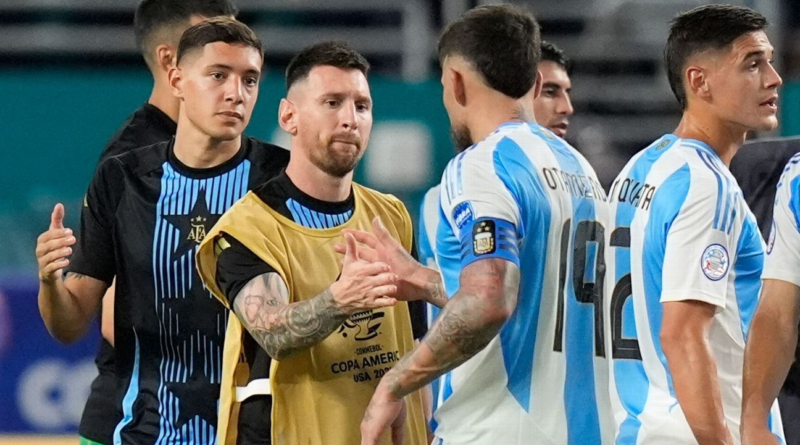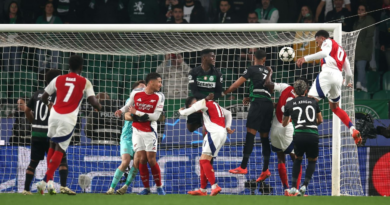No Messi, no problems: Scaloni's Argentina are built to win without their star
MIAMI GARDENS, Fla. — Lionel Messi watched from the substitute’s bench as secondary captain Ángel Di María led Argentina to a 2-0 victory over Peru and first place of Group A in the final group stage match of the 2024 Copa América at Hard Rock Stadium on Saturday night.
The scene felt almost foreign, given the Inter Miami CF figure has proudly worn the captain’s armband for Argentina in every major tournament since initially receiving the title in 2010. But after suffering an injury to his right leg during the match against Chile on Tuesday, the coaching staff ruled out his participation for Saturday’s game.
Years ago, his absence would’ve sent chills down the spine of most teammates and supporters. La Albiceleste depended on Messi alone to construct in the midfield, weave through defenders and rocket the ball into the back of the net to secure a victory.
But since manager Lionel Scaloni took over the project, he vowed to make a lasting impact beyond any possible victory. He pledged to build La Albiceleste into a functioning team that benefits from the presence of Messi, but does not actually depend on it.
“We are working on making a team, and if we also have the best player in the world, which is Messi, even better but we want to form a solid team that gives off the image that it will be difficult to beat. That’s why we are focused on putting together a team that when Messi adds to it, is even better,” he promised in 2019.
Scaloni may not have been on the sidelines against Peru after being sanctioned by CONMEBOL for delaying the team’s return to the pitch during the match vs Chile, but his legacy could be seen in full force.
The first half of the game saw an aggressive Argentinian side, reaching the opposition box on several occasions after connecting from the backline and through the midfield to record three shots and enjoy 78% possession. Players tested Peru goalkeeper Pedro Gallese, forcing him to make a couple stunning saves to keep the scoreline at 0-0 at the break.
But the real magic kicked off in the second half, when Leandro Paredes found Di Maria from the midfield to initiate the first goal-scoring opportunity of the match. Di Maria only retained the ball for a second before reaching Lautaro Martínez just inside the box with a left-footed pass, allowing the player to fight off a defender and find the back of the net. Supporters cheered at the stadium’s large screens as the replay showed Di Maria’s pass to Martinez, emphasizing the way the two players communicated perfectly in the blink of an eye.
Argentina were given an opportunity to stretch the lead through a handball by Peru inside the box, before Paredes stepped up and hit the post. Martinez then returned for a second goal, receiving the ball off a long pass from the middle of the pitch before weaving into the box for the right-footed shot over the goalkeeper. The Internazionale player may have doubled the score in a moment of brilliance, but it was Enzo Fernández‘s spatial awareness that allowed him to comprehend the position of his teammate.
Despite the missed penalty, La Albiceleste proved that a successfully implemented system by a collective can uplift even the gravest of errors because a result no longer depends on one individual’s effort. Argentina concluded the match with 12 shots, six on target, 76% possession and two goals, all without the famous No. 10 on the pitch.
The performance obliterated any remnants of the Messi dependency that once reigned supreme prior to 2019. Messi’s individual brilliance previously carried victories, masking the weaknesses of an otherwise struggling team. His sole efforts and unique vision of the sport propelled La Albiceleste teammates to rely on finding him on the pitch rather than initiate their own goal-scoring opportunity. And when Messi struggled to score the opportunities put in front of him, the team struggled too.
During Argentina’s second group stage match of the 2018 World Cup against Croatia, Messi found himself lost under a confusing set of tactics by then-manager Jorge Sampaoli. His decision to switch from a 4-2-3-1 formation to an undefined 3-4-3 left Messi muted in the midfield, canceling out the team’s greatest weapon. Argentina went on to lose 3-0, unveiling the defensive flaws that Messi once worked tirelessly to conceal.
When Messi didn’t do it all on the pitch, Argentina fell short. And the theme often prevailed, reflecting a lack of trophies despite participating in the 2014 World Cup final and 2015 and 2016 Copa América finals.
Now, six years after the height of Messi dependency at the World Cup, Argentina boast three major titles and a confident 2024 Copa América run with Scaloni at the helm, Messi as captain and a functioning Albiceleste roster to enhance his talent.
Argentina will now prepare to face an undetermined rival from Group B on Thursday at NRG Stadium in Houston for the first knockout match of the tournament. Messi may return, as the coaching staff continues to monitor him on a day-by-day basis. But the team and fan base no longer have to look at the diagnostic with fear and dependency, knowing Martinez, Di Maria and Alejandro Garnacho, who made his starting debut on Saturday, proved the job can provide depth when necessary.
Messi’s brilliance may now be enjoyed and admired by teammates and fans, but no longer depended on as the sole source of joy this team can provide. The famous No. 10 now forms part of a larger organism under Scaloni that can give the Argentine population real hope of becoming consecutive champions of the Copa América.



